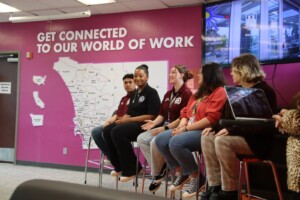14 High Schools Worth Visiting

An international school administrator recently wrote:
“I have been here for about two months now and am enjoying the challenge. Much of what we are faced with in education is the same, but there is the international context that is terribly interesting. One of the characteristics of this system is that the high school is stuck, much like many of our high performing suburban high schools in the U.S. And as such, I’m pushing them to get outside of their own comfort zone and challenge old assumptions to do something different. As a result I am going to take a small R&D core team from the high school to do a ‘walk-about’ and look at some of the best practices of true high school reform.”
Below is a list of high schools worth visiting:
1. Show & Tell. High Tech High is probably the best example of a high-engagement cohort model secondary school. Great teachers frame great projects and expect students to show what they know on a regular basis.
2. Blended. Carpe Diem , located in Yuma Arizona, is the best example of a 50/50 blend with an effective combination of personalized online learning in a lab setting and workshops taught by master teachers.
3. Classroom assessment. As featured in a recent Getting Smart blog, the staff at Leadership Public Schools in Oakland built Exit Ticket, a classroom assessment and competency tracking system. LPS is the best example of a collaborative and distributed innovation agenda across a network of schools.
4. Flipped school. Greg Green is principal of Clintondale High School in Michigan. They flipped much of their instruction using content on Gooru. Learn more about Clintondale onThe Flip Institute blog.
5. Competency-based learning. Flex model schools , like Silicon Valley Flex, use a digital curriculum to support individual progress. Kunskapsskolan, a Swedish school network, which was recently described in a Getting Smart blog, uses technology to support individual goal setting. See CompetencyWorks for more on this topic.
6. Project-based learning. The 100-school Edvisions high schools use Project Foundryand a variety of tools to support project-based learning and authentic assessment.
7. Internships. The 100-school Big Picture network does the best job of identifying student interest and creating related internships.
8. Personal Learning Network (PLN). New Milford High School Principal Eric Sheninger (@NMHS_Principal) learned a lot from his PLN. His network taught him to transform the way he communicates and the way the school interacts with the community. Read Sheninger’s great HuffingtonPost summary.
9. Travel. THINK Global School students use the latest equipment to “record, report, and share their global education online as they travel the world.”
10. Challenge. NYC iSchool blends computer adaptive learning with challenges that require students to work together to present real solutions to real problems.
11. Projects. The New Tech Network is the first platform-centric school development networks (most school networks will follow). Echo, the project-based learning management system, powers the 100+ school network.
12. Heart. Mooresville, North Carolina superintendent says, ” It’s not about the machine, it’s about heart,” but his students sure make great use of their MacBooks. The innovation in Mooresville is the system-expectations, culture, curriculum, tools, and support.
13. Application. There are about 100 next-gen, upper-secondary schools in Denmark with a focus on business (HHX) and technology (HTX) that are worth visiting. While schools in Denmark, get an overview of the 111 vocational programs with job specific training and certification.
14.Bay Blends. Take two days and visit some great early Bay Area blended schools including Summit West and Downtown College Prep in San Jose and one of the Leadership Public Schools in Oakland.
This blog first appeared on EdWeek.








Debt Free Teen
Wow-it's so great to see that education is changing for the better! I went to a hybrid school before anyone knew what a hybrid school was. Now there are so many choices!